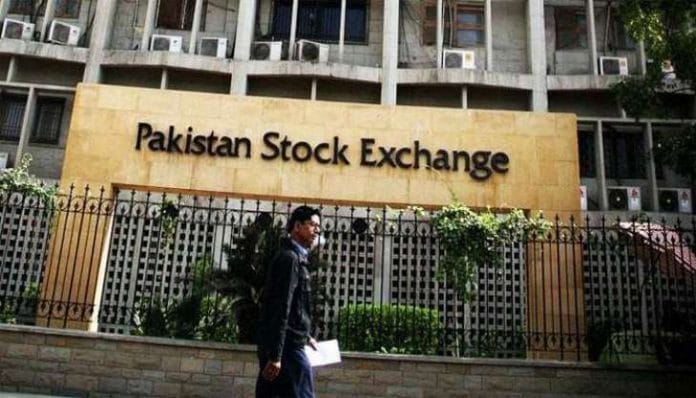New Delhi: Pakistan Stock Exchange is defying the larger economic trend in the country and breaking all records with the KSE100 breaching 90,000 points in intra-day trading. Analysts and experts attributed the phenomenal run of the bull market to the $3 billion IMF loans, expectations of a rate cut by the country’s central bank, low price-to-earnings ratio, and a relatively stabilised currency.
Widespread buying activity was seen in key sectors, including oil and gas exploration, oil marketing, power generation, automobile assembly, cement, and banking.
Market analysts attribute this bullish trend to expectations of another rate cut by the State Bank of Pakistan (SBP), fueled by predictions of lower inflation in October with many anticipating a cut of 200 basis points, marking the fourth consecutive reduction since June.
Former Finance Minister Miftah Ismail told ThePrint that there are broadly two reasons driving the surge in Pakistan’s stock market. The first is that the market is expecting SBP to cut its policy interest rate by 200 basis points. Typically, an interest rate cut acts as a boost to economic growth, although it can also push inflation up.
The second factor, he said, was that the price-to-earnings ratio—a measure to gauge how linked the stock price of a company is to its profitability—is still low in Pakistan as compared to other emerging markets. This means there is considerable room for stock prices to grow further.
Economist Javed Hassan added that the performance of the stock market is also fuelled by deeply discounted valuations of most of the companies. Just a year back, the market was trading at below 5Xs prospective PE ratio, he said, which made it among the cheapest market in emerging and frontier markets. “Many of the banks were trading at well below book value. Such valuations effectively were discounting the possibility of default and economic implosion,” he added.
But now with Pakistan signing on to the latest IMF EFF, those fears have abated, and the stocks reflect a more stable macroeconomic environment.
In India, the Nifty index declined for the third consecutive session on 23 October, closing at its lowest point in over two months. Global markets too faced pressure from a rising dollar, a lowered growth forecast from the IMF, uncertainty surrounding the US elections, escalating geopolitical tensions, and expectations of a less aggressive approach from the US Federal Reserve regarding rate cuts.
An upward trajectory
Several factors contribute to the rise of Pakistan’s stock market. Notably, improved macroeconomic conditions, including a decline in inflation and stabilising monetary indicators, have been pivotal. Investors are also expecting a significant cut in the policy rate, which could boost market performance further.
Additionally, the International Monetary Fund (IMF) has approved a $7 billion loan for Pakistan aimed at stabilising the economy. This loan will be disbursed to Islamabad in installments over 37 months and is designed to support the country’s economy.
Moreover, the market’s recent performance has been buoyed by favourable macroeconomic conditions, such as a decrease in inflation and anticipated monetary policy adjustments.
Pakistan’s annual consumer price inflation stood at 6.9 per cent in September, the lowest in three years. It had dropped from 9.6 per cent in August.
Strong performances in key sectors—particularly oil, gas, banking, and cement—are driving the rally. The oil and gas sector, especially, has made notable contributions, with stocks like Oil and Gas Development Company (OGDC), Pakistan Petroleum Ltd (PPL), and Pakistan State Oil (PSO) experiencing substantial gains.
“However, this does not suggest that the economy is out of the woods and poised to grow sharply. The fundamentals remain precarious, and the growth over the next couple of years is projected by the IMF to remain below 5 per cent,” Hassan said.
Ismail added that the strong performances, even if there are issues in the Middle East, will drive the oil and gas sector further. The recent surge in the Pakistan Stock Exchange (PSX) can also be attributed to a robust combination of local investor confidence and strong institutional backing, creating an environment ripe for a significant market rally. This enthusiasm among investors has been a crucial driver of the stock market’s momentum, economic experts pointed out.
“After nearly three years of stagnation, the PSX began its upward trajectory following the securing of a $3 billion IMF Stand-By Arrangement. This development signalled a restoration of macroeconomic stability and a political commitment to necessary reforms,” economist Uzair Younus told ThePrint.
Investors perceive SBP’s signals of potential rate cuts as a green light for increased borrowing and spending, which could stimulate economic activity.
“Given that interest rates have peaked, the currency has stabilised, and inflation has come down dramatically, domestic and foreign investors have piled into the PSX. This trend is expected to continue as the price-to-earnings ratio at the PSX still hovers around 5x, compared to over 20x for the Bombay Sensex,” Younus added.
(Edited by Theres Sudeep)






